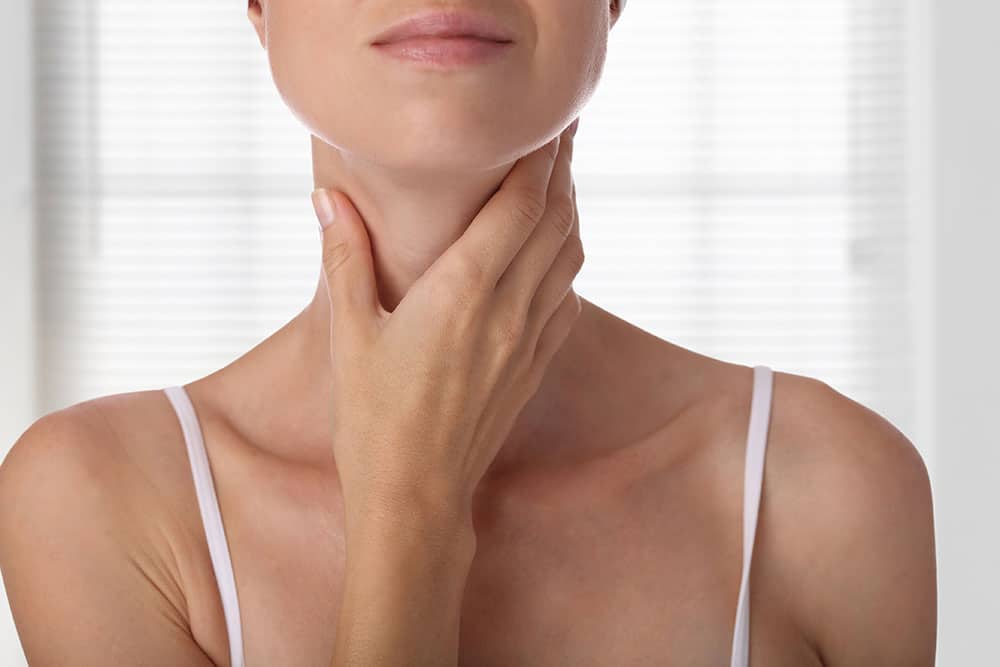1 in 3 Canadians have Low Thyroid

Recent studies indicate that 1 in 3 Canadians have a thyroid disorder. Of those, up to 50% are undiagnosed!
The Thyroid gland is a small, butterfly-shaped gland located in the base of the neck on both sides of the lower part of the voice box (larynx) and upper part of the wind pipe. The thyroid produces hormones called thyroxine (T4) and triiodothyronine (T3), which regulate the body’s metabolism by controlling body temperature, the synthesis of protein and the release of energy from the cells.
Hypothyroidism (underactive or low thyroid function) is the most common thyroid disorder, affecting up to 25% of North American women and 10% of men. Symptoms vary widely and can develop slowly over years – making them easily mistaken for other issues or overlooked.
Symptoms:
- Fatigue
- Weight gain
- Cold hands and feet
- Depression
- Puffy face
- Difficulty staying warm
- Thin, brittle nails
- Hair loss
- Headaches
- Infertility, miscarriage
- Dry, brittle hair
- Low libido
- Dry, pale, scaly skin
- Constipation
Hypothyroidism or Low Thyroid occurs when the thyroid gland fails to produce sufficient amounts of the thyroid hormones T4 and T3 or if there is a failure in the conversion of T4 to T3. When blood levels of T3 and T4 increase, the pituitary gland slows down production of TSH. Commonly, TSH is the only blood test ordered to measure thyroid function. If the TSH falls between 0.38 to 5.5 IU/ml the test is generally considered normal. However, most naturopathic doctors and some medical doctors will treat patients if the TSH lab value is above 1.9 – especially if you have several of the low thyroid symptoms.
Risk Factors:
Hypothyroidism is often more common in older women. Many doctors regularly screen older women for low thyroid disease during routine annual physicals. However, this does not always happen. Most women who are approaching menopause will experience symptoms of low thyroid. Because many symptoms are very similar to menopausal symptoms, it will often go unnoticed. Don’t assume that symptoms are due to peri-menopause or menopause, you could be suffering from symptoms of low thyroid.
Risk factors include:
- Female over 50
- Autoimmune disease
- Close relative with low thyroid or autoimmune disease
- Previously treated with radioactive iodine
- Radiation to neck or upper chest
- History of thyroid surgery
Doctors often also recommend that pregnant women or women thinking about becoming pregnant be tested for low thyroid due to infertility and miscarriage issues.
Clinically low thyroid, as confirmed by your doctor, requires prescription medication. However, if your tests come back normal and you are still experiencing symptoms you can support your thyroid with a natural formulation containing L-tyrosine, ashwagandha, guggul, pantothenic acid, copper, manganese, iodine and selenium as found in ThyroSense®.
I recommend ThyroSense for the support of thyroid health in my patients with symptoms of low thyroid. It does not replace prescription thyroid medication, but can provide nutritional support to help with the symptoms of low thyroid. ThyroSense can also be used by women already on low thyroid medication but still experiencing symptoms. Ask for ThyroSense at your local natural health retailer.
Dr. Marita Schauch BSc ND is a graduate of the Canadian College of Naturopathic Medicine, Canada’s premier institute for education and research in naturopathic medicine. Dr. Schauch’s health articles educate the public about health and wellness and have been featured in numerous print media. She currently resides and has her clinical practice in Victoria B.C. www.drmarita.com
